Sleep apnea affects millions of Americans. While more men than women have this sleep disorder, people of both sexes and all ages can suffer from its adverse health impact. Fortunately, here at Heart & Sleep Clinics of America in Arlington, TX, Dr. Atif Sohail and his team help patients manage their sleep apnea symptoms.
What is sleep apnea?
Sleep apnea involves repeated episodes of loud snoring and breathing cessation during the night or even a daytime nap. People waken suddenly, gasp for air, and fall back to sleep. This can happen almost innumerable times a night, according to the National Sleep Foundation.
Most often, sleep apnea occurs when the tissues at the back of the throat, including the tongue, relax and block the airway. This kind of sleep apnea is known as OSA, or Obstructive Sleep Apnea. Other people may have Central Sleep Apnea, or CSA, in which the respiratory and nervous systems do not communicate well. A third kind is Mixed Sleep Apnea, which features symptoms of OSA and CSA together.
Unfortunately, sleep apnea is more than a nuisance. It harms systemic health, causing such adverse effects as heart attack, stroke, and hypertension. Other issues that appear linked to this sleep disorder are diabetes, memory problems, anxiety, depression, and more.
What are the symptoms of sleep apnea?
The most noticeable sign is loud snoring, especially if the noise is so excessive that it disturbs spouses and others in the household.
In addition, sleep apnea sufferers exhibit:
- Daytime fatigue and sleepiness
- Poor concentration
- Morning headache
- Dry mouth
Notable contributing factors are obesity and large neck circumference. However, even when these are modified, symptoms may not subside sufficiently. That's where sleep apnea treatment from Heart & Sleep Clinics of America in Arlington, TX, comes in.
Should you treat your sleep apnea?
The answer is yes, you should. Tell your primary care physician about your snoring and other symptoms. He may recommend you visit Dr. Atif Sohail for analysis of your symptoms and a home-based sleep study. Also called polysomnography, a sleep study will monitor your sleep pattern and vital signs during the night, telling the doctor if you have sleep apnea.
If you do, Dr. Sohail may advise lifestyle changes such as losing weight, limiting alcohol consumption, and sleeping on your side rather than on your back. Oral appliance therapy—also called a sleep guard—keeps the jaw in a forward position as you sleep and opens the airway.
These acrylic mouthpieces may be used singly or in conjunction with CPAP, or Continuous Positive Airway Pressure. CPAP machines deliver continuous air through a facial mask to keep the back of the throat patent.
Snore no more
At Heart & Sleep Clinics of America, cardiologist Dr. Atif Sohail and his staff solve the dangerous health condition we know as sleep apnea. For your personal consultation, please call our Arlington, TX, office at (817) 419-7220.
